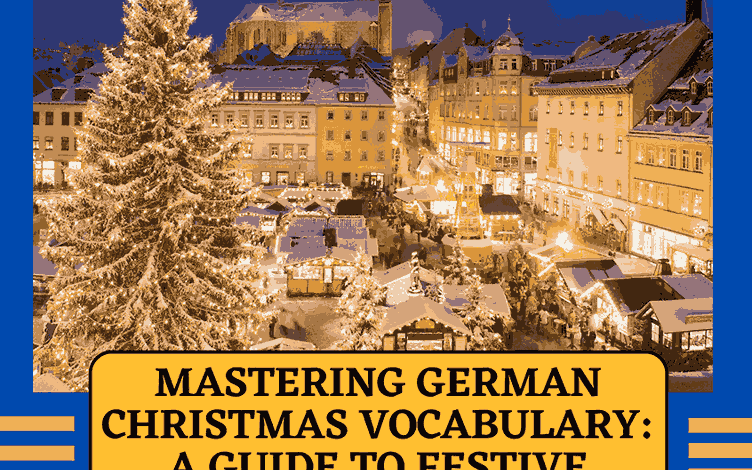Mastering German Christmas Vocabulary: A Guide to Festive Celebrations

Mastering German Christmas Vocabulary: A Guide to Festive Celebrations
Christmas is just around the corner, and for international residents in Germany, mastering the local language can add an extra layer of joy to the festive season. In this guide, we’ll explore the essential vocabulary you need to celebrate Christmas in true German style. From general terms to traditions, festive treats, and dinner table etiquette, we’ve got you covered. This article will help you Mastering German Christmas Vocabulary with our Guide to Festive Celebrations.
1. General Vocabulary:
-
- In German, Christmas is known as ‘Weihnachten,’ encompassing Christmas Day (the 25th) and referred to as Weihnacht, Christfest, or Heiliger Christ.
- Christmas Eve, the main day of celebration for Germans, is called Heiliger Abend or Heiligabend.
- Discuss local traditions using the terms Bräuche or Traditionen.
- Engage in conversations by asking about specific Christmas practices: “Welche Weihnachtstraditionen habt ihr in deine Region?” or “Gibt es bestimmte Weihnachtsbräuche, die hier in Sachsen üblich sind?”
- Use Weihnachtsfeier when referring to a Christmas celebration.
2. In the Run-up to Christmas:
-
- The festive period kicks off with Adventzeit, starting on November 27th.
- Adventskranz, an advent wreath with four candles, symbolizes the four weeks leading up to Christmas.
- Explore local Christmas markets (Weihnachtsmarkt) and indulge in Adventsbacken, traditional cakes, and cookies.
- Embrace the joy of Vorfreude, the anticipation of something delightful.
3. Around the Dinner Table:
-
- Familiarize yourself with traditional Christmas dishes, such as Weihnachtsgans (Christmas goose) or Ente (duck).
- Enjoy side dishes like Rotkohl (red cabbage), Kartoffeln (potatoes), or Knödeln (dumplings), complemented by Bratensauce (gravy).
- Acknowledge the deliciousness of the food using terms like “lecker” or “köstlich.”
- Politely decline additional servings with phrases like “Danke, aber ich kann nicht mehr!”
4. Opening Gifts:
-
- Understand the significance of the Weihnachtsbaum (Christmas tree) and the placement of gifts underneath.
- Avoid confusion by using Geschenke (gifts) instead of the false friend “Gift.”
- Express gratitude with phrases like “Es gefällt mir sehr gut!” or “Das ist sehr großzügig von dir.”
Mastering these essential Christmas vocabulary terms will not only help you navigate the festive season in Germany but also allow you to impress your German friends and family with your language skills. So, whether you’re savoring festive treats, engaging in Christmas traditions, or exchanging thoughtful gifts, enjoy the season in true German style. Frohe Weihnachten!
Read More on How To Abroad
Fun things to do at Christmas time in Germany
Christmas Offers 2023: Up to 70% off on amazon.de
Want to study in Germany? How To Abroad can help you achieve your academic dreams.

